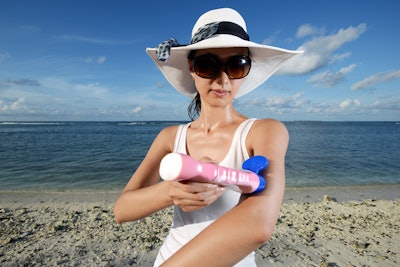 [Images: Getty Images]
[Images: Getty Images]There’s an old joke about a man who prays fervently every day to win the lottery. Years pass and finally, after his umpteenth request, a booming voice from the heavens responds: “Meet me halfway… buy a ticket.” The message, of course, is that to get what we wish for in life–be it extreme wealth or exceptional skin–we must do our part. For your clients seeking a heaven–sent complexion, “their part” equals a wide range of skin–supporting lifestyle choices.
The reality is that spectacular facial treatments will only do so much for the person who burns the candle at both ends, brakes in the sun or subsists on junk food. Moreover, if estheticians don’t offer guidance about behaviors that can help or harm skin health, they’re doing their clients–and their spas–a disservice. So we sorted through the latest science and spoke with pros in the know to bring you seven key skin-saving suggestions that you should be sharing.
1) Feed Your Face: The skin needs to be nourished, and not just from the outside. For starters, its very structure requires protein to keep it intact, notes Christian Jurist, MD, medical director of global education for Pevonia in Daytona Beach, Florida. “Daily protein intake supports collagen, elastin and other fibers to maintain healthy, firm and young-looking skin,” he explains. A cup of chopped chicken breast provides 43 grams of protein; Greek yogurt offers 23 grams per cup; and most fish provides more than 20 grams per 3-ounce serving.
RELATED: Proper Skin Cleansing Advice for Your Clients
The added bonus of eating fish is that many varieties are rich in omega-3 essential fatty acids that—along with the omega-6 fats found in plant oils—contribute to healthy cell membranes and the skin’s protective oil barrier, while imparting an anti- inflammatory effect. Kimberly Snyder, a New York City-based nutritionist who has authored multiple books on diet and beauty, touts hemp milk for this reason. “It’s one of my favorite non-dairy milks because it’s rich in ‘beauty fats,’ including the omega-3s that help build supple, beautifully smooth skin,” she notes.
Other skin-loving superfoods Snyder suggests include bee pollen, which possesses antifungal, antimicrobial, antiviral and anti-inflammatory properties; acai, found in a 2017 Toxicological Research study to support wound healing; and numerous varieties of sprouts, most of which are high in antioxidants— important for bolstering the skin’s ability to fend off free radicals. Because antioxidants are so vital to skin health, you should also advise clients to consume foods rich in vitamins A (carrots, sweet potatoes), C (citrus, broccoli) and E (nuts, olives), as well as lycopene (tomatoes, watermelon) and selenium (Brazil nuts, yellowfin tuna).
2) Drink Up: Failure to get enough fluids can dry out the skin and leave it more vulnerable to signs of aging. “When we’re dehydrated, our organs have a harder time working efficiently, natural detoxification slows down and the skin starts looking weathered,” notes Snyder. The ideal amount of water consumption varies, depending on factors including body weight and activity levels, but the Mayo Clinic in Rochester, Minnesota, recommends daily averages of 9 cups for women and 13 cups for men. It’s also worth advising clients that certain medications can lead to dehydration, as can extreme weather and excessive sweating, smoking (a major skin-ager for many reasons!), and ingesting too much alcohol or caffeine. Above all, encourage them to be proactive with water intake, rather than wait until they feel thirsty.

RELATED: Spa Pros Reveal the Benefits of Retinol
4) Keep it Clean: Another enemy to the skin is air pollution. A review of studies published in the journal Cosmetics (January 2018) noted that exposure to environmental pollutants (both indoors and outside), including carbon monoxide, nitrogen dioxide and volatile organic compounds, can cause premature skin aging, pigmentation spots and acne, as well as more chronic conditions such as atopic dermatitis and psoriasis. To counter the effects of pollution on clients’ skin, emphasize a skincare regimen that includes: an antioxidant serum and a barrier protection product in the morning; and a thorough, non-stripping cleanser and calming, moisturizing and nourishing skin recovery system before bed. “If you don’t cleanse your face at night, you make it difficult for your skin to repair itself because it has to fight the pollution, bacteria and dirt you didn’t wash off,” warns Rivas.

RELATED: Why Shea Butter is an Esthetician’s Best Friend
Perhaps in no other aspect of health is the concept of “cycles” more important than during slumber. “Nature tells us hot to live in rhythm, and that includes when to sleep,” says SpaRitual founder Shel Pink, Los Angeles- based author of Slow Beauty: Rituals and Recipes to Nourish the Body and Feed the Soul (Running Press, 2017). “At one time, we all used to sleep and rise with the sun.” Since that schedule is rarely practical anymore, Pink instead suggests simply being consistent with sleeping and waking times. “Dim the lights in the evening, and upon waking, go outside and get natural light into your eyes to jumpstart your system,” she adds. Sleep experts also recommend turning off or putting away all mobile devices at least an hour before bedtime, since the blue light they emit tricks our brains into thinking it’s daytime.
6) Stress Less: Similar to a lack of sleep, excessive angst spurs potentially destructive hormones into action. “When you’re under a lot of stress, your body releases more cortisol,” says Rivas. This can lead to all the aforementioned skin issues, including collagen breakdown. “The skin loses elasticity and becomes saggy,” she notes. Even its ability to hold onto water is compromised. The result: age spots, sunken eyes, wrinkles and a duller complexion overall. Stress also contributes to sleep disturbances, leaving the skin caught up in a vicious cycle. The best way to break that cycle is with techniques such as meditation (“which also helps relax facial muscles,” reminds Pink), mindfulness, yoga and tai chi.
7) Move More: Physical activity can do wonders for the complexion. “The increased blood flow from exercise delivers vital nutrients and oxygen to skin
cells,” notes Rivas. In fact, a study led by researchers at McMaster University in Ontario, Canada, suggested exercise may slow or even reverse skin aging. Ultimately, every lifestyle choice, from nutrition and hydration to workouts and relaxation, has the potential to boost overall health, as well as the health of the body’s largest organ. The good news is that, for the most part, skin is pretty forgiving. As Snyder notes, “You can expect to see more of a general ‘glow’ in only a few days, once you’ve consciously shifted toward healthier habits, including consistent physical activity.”
–by Linda Kossoff











